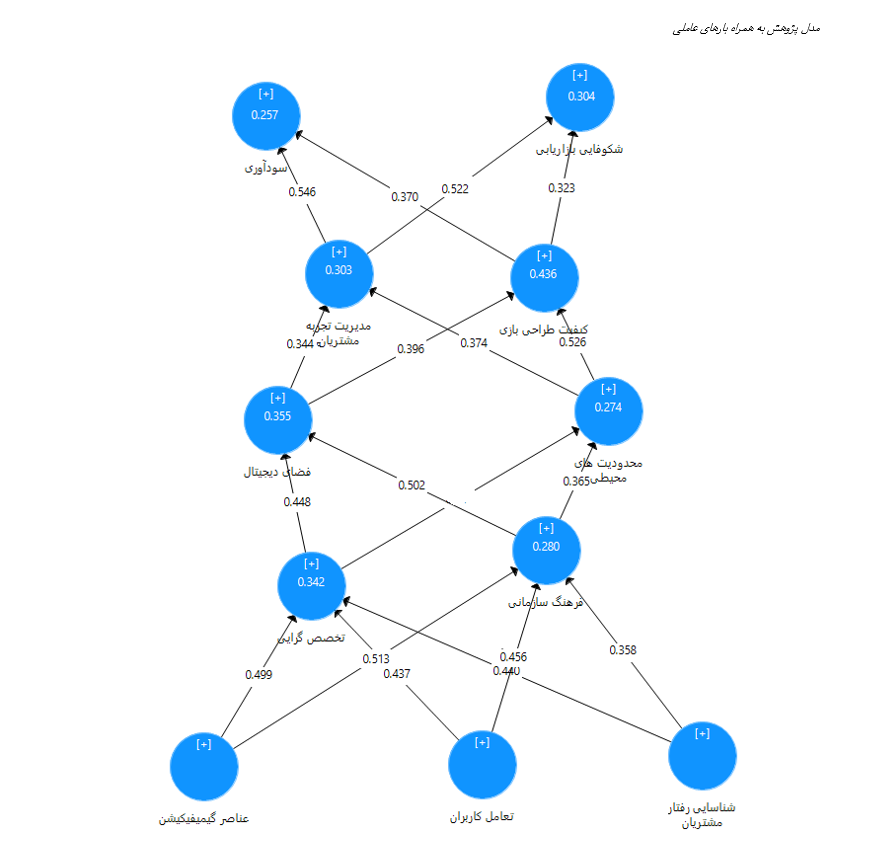بررسی عوامل موثر بر گیمیفیکیشن در بازاریابی دیجیتال در مجتمع فنی تهران
کلمات کلیدی:
گیمیفیکیشن, بازاریابی دیجیتال, تعامل کاربران, فضای دیجیتال, سودآوری, مدلسازی معادلات ساختاری, مجتمع فنی تهرانچکیده
این پژوهش به بررسی عوامل مؤثر بر گیمیفیکیشن در بازاریابی دیجیتال در مجتمع فنی تهران میپردازد. هدف اصلی مطالعه، شناسایی و تحلیل مؤلفههایی است که میتوانند بر موفقیت گیمیفیکیشن و بهبود تعامل کاربران، تجربه مشتریان و سودآوری سازمان تأثیرگذار باشند. این تحقیق از روش ترکیبی کیفی-کمی استفاده کرده است. در مرحله کیفی، مصاحبههای نیمهساختاریافته با خبرگان و مدیران مجتمع فنی تهران انجام شد و دادهها با استفاده از روش نظریه دادهبنیاد تحلیل گردید. در مرحله کمی، بر اساس نتایج کیفی، پرسشنامهای محققساخته طراحی و بین 384 نفر از متخصصان و کارشناسان بازاریابی توزیع شد. تحلیل دادههای کمی با استفاده از مدلسازی معادلات ساختاری (SEM) انجام گرفت. نتایج نشان داد که تعامل کاربران، فضای دیجیتال، و سودآوری از مهمترین عوامل مؤثر بر موفقیت گیمیفیکیشن در بازاریابی دیجیتال هستند. همچنین، شناسایی رفتار مشتریان و مدیریت تجربه مشتریان نیز نقش قابل توجهی در این زمینه ایفا کردند. مؤلفههای فرهنگ سازمانی و تخصصگرایی تأثیر متوسطی داشتند، در حالی که محدودیتهای محیطی و برخی عناصر گیمیفیکیشن تأثیر کمتری نسبت به سایر عوامل نشان دادند. پژوهش حاضر نشان میدهد که طراحی مؤثر گیمیفیکیشن و ایجاد محیطهای دیجیتال تعاملی میتواند بهبود چشمگیری در تجربه کاربر و سودآوری سازمان ایجاد کند. با این حال، برای موفقیت پایدار، لازم است که سازمانها فرهنگ نوآورانه و بسترهای تخصصی لازم را فراهم کنند. یافتهها نشان میدهند که استفاده از گیمیفیکیشن باید به صورت استراتژیک و با توجه به نیازهای کاربران و شرایط محیطی صورت گیرد.
دانلودها
مراجع
Al-Zyoud, M. F. (2021). The impact of gamification on consumer loyalty, electronic word-of mouth sharing and purchase behavior. Journal of Public Affairs, 21(3), e2263. https://doi.org/10.1002/pa.2263
Barari, M. (2024). How and When Does Gamification Level Up Mobile App Effectiveness? Meta-Analytics Review. Marketing Intelligence & Planning, 42(6), 1093-1114. https://doi.org/10.1108/mip-10-2023-0569
Başaran, Ü. (2022). Gamification in Marketing. 137-165. https://doi.org/10.4018/978-1-7998-9223-6.ch007
Behl, A., Jayawardena, N. S., Shankar, A., Gupta, M., & Lang, L. D. (2023). Gamification and Neuromarketing: A Unified Approach for Improving User Experience. Journal of Consumer Behaviour, 23(1), 218-228. https://doi.org/10.1002/cb.2178
Berger, V. (2019). Social Norm-Based Gamification to Promote Eco-Friendly Food Choice. Journal of Consumer Marketing, 36(5), 666-676. https://doi.org/10.1108/jcm-01-2018-2547
Girdauskiene, L. (2022). Gamification as an Innovative Instrument for Employee Engagement. Marketing and Management of Innovations, 1(1), 10-17. https://doi.org/10.21272/mmi.2022.1-01
Harwood, T., & Garry, T. (2015). An Investigation Into Gamification as a Customer Engagement Experience Environment. Journal of Services Marketing, 29(6/7), 533-546. https://doi.org/10.1108/jsm-01-2015-0045
Haryanti, D. (2023). Optimizing Marketing Learning Evaluation: Gamification With CIPP Model at SMKN 1 Bandung. J. Curric. Dev., 2(2), 251-268. https://doi.org/10.17509/curricula.v2i2.63765
Hofacker, C. F., Ruyter, K. d., Lurie, N. H., Manchanda, P., & Donaldson, J. (2016). Gamification and Mobile Marketing Effectiveness. Journal of Interactive Marketing, 34(1), 25-36. https://doi.org/10.1016/j.intmar.2016.03.001
Huotari, K., & Hamari, J. (2016). A Definition for Gamification: Anchoring Gamification in the Service Marketing Literature. Electronic Markets, 27(1), 21-31. https://doi.org/10.1007/s12525-015-0212-z
Kusumawardani, K. A., Widyanto, H. A., & Tambunan, J. E. G. (2023). The Role of Gamification, Social, Hedonic and Utilitarian Values on E-Commerce Adoption. Spanish Journal of Marketing - Esic, 27(2), 158-177. https://doi.org/10.1108/sjme-09-2022-0188
Leclercq, T., Hammedi, W., & Poncin, I. (2018). The Boundaries of Gamification for Engaging Customers: Effects of Losing a Contest in Online Co-Creation Communities. Journal of Interactive Marketing, 44(1), 82-101. https://doi.org/10.1016/j.intmar.2018.04.004
Loureiro, S. M. C., Bilro, R. G., & Angelino, F. (2020). Virtual Reality and Gamification in Marketing Higher Education: A Review and Research Agenda. Spanish Journal of Marketing - Esic, 25(2), 179-216. https://doi.org/10.1108/sjme-01-2020-0013
Milanesi, M., Guercini, S., & Runfola, A. (2022). Let’s Play! Gamification as a Marketing Tool to Deliver a Digital Luxury Experience. Electronic Commerce Research, 23(4), 2135-2152. https://doi.org/10.1007/s10660-021-09529-1
Mok, T. L. (2024). Fun as the Principle Experience: A Systematic Review of Gamification in Marketing. https://doi.org/10.32920/25164581.v1
Mulcahy, R., McAndrew, R., Russell‐Bennett, R., & Iacobucci, D. (2021). “Game On!” Pushing Consumer Buttons to Change Sustainable Behavior: A Gamification Field Study. European Journal of Marketing, 55(10), 2593-2619. https://doi.org/10.1108/ejm-05-2020-0341
Ndi, A. (2018). Digital Marketing Gamification and Limitations of Its Strategic Power: Exploring the Online Universe of the Consumer in Critical Contexts of Political Economy. Greener Journal of Internet Information and Communication Systems, 4(1), 20-29. https://doi.org/10.15580/gjiics.2018.1.112018162
Noorbehbahani, F., Salehi, F., & Zadeh, R. J. (2019). A Systematic Mapping Study on Gamification Applied to E-Marketing. Journal of Research in Interactive Marketing, 13(3), 392-410. https://doi.org/10.1108/jrim-08-2018-0103
Saprikis, V., Spanou, M. S., Despotakis, N., & Katos, G. (2023). Evaluating customer perceptions toward AR-based online shopping: An analysis of the effects of gamification on brand engagement. European Journal of Marketing, 57(6), 1465-1492. https://doi.org/10.1108/EJM-12-2021-0923
Thorpe, A. S., & Roper, S. (2017). The Ethics of Gamification in a Marketing Context. Journal of Business Ethics, 155(2), 597-609. https://doi.org/10.1007/s10551-017-3501-y
Tsou, H.-T. (2023). How Gamification Elements Benefit brand Love: The Moderating Effect of Immersion. Marketing Intelligence & Planning, 41(7), 1015-1036. https://doi.org/10.1108/mip-04-2023-0143
Yang, Y., Asaad, Y., & Dwivedi, Y. K. (2017). Examining the Impact of Gamification on Intention of Engagement and Brand Attitude in the Marketing Context. Computers in human Behavior, 73, 459-469. https://doi.org/10.1016/j.chb.2017.03.066

دانلود
چاپ شده
ارسال
بازنگری
پذیرش
شماره
نوع مقاله
مجوز
حق نشر 2025 Maryam Sharifi Hashjin (Author); Farzad Asayesh; Mahmoud Ahmadi Sharif (Author)

این پروژه تحت مجوز بین المللی Creative Commons Attribution-NonCommercial 4.0 می باشد.










